| By Prashant Singh |
|
THE STARTERS Turn back the clock. The real craze for reality television hit India as Channel [V] introduced Viva, a band of five young girls. As the channel opened gates for new world, young dreamers gathered in hordes to give their luck a try. They cried and celebrated with their failure and triumph. And the audiences, on its part, lapped up this overdose of emotions. No wonder then, it was a big success and an inspiration for both the shrewd business minds and youngsters waiting for their share of fame. "But all of them can't be successful. Ultimately their hardwork, their planning and how well they handle their career matters. These shows can certainly give them an initial boost, but nothing more than that," says Vishal Dadlani of Vishal-Shekhar duo. Post-Viva's arrival, there has been no looking back for musical television shows. As the real-life Bunty and Bablis rush to test their vocal chords, the burgeoning entertainment industry h as spawned a number of shows like Indian Idol, Fame Gurukul, Voice Of India, Sa Re Ga Ma Pa and Fame X. Today, every channel has an Abhijeet Sawant or Aneek Dhar to boast of. "There is no doubt that singing-based talent shows are a definite hit in our country. This is a new phenomenon that needs to be encouraged. However, I am totally against the voting system as the judgement should entirely depend on judges," says Khayyam. NO TALENT Reality shows has not only changed the destinies of TV channels, but also of several common people. But barring names such as Kunal Ganjawala, Sunidhi Chauhan, Shreya Ghosal and Anushka Manchanda, a majority are scrounging for their share of fame and money. So, it doesn't come as a surprise if names like Vinit Singh, Ujjaini, Aishwarya, Sharib, Amit Sana, Bonjyotsana, Qazi Tauqeer and Sandeep Acharya fail to ring a bell. "It is impossible to make a singer in three or six months. And this is the main reasons behind talent hunt winners not doing well in Bollywood or any music industry. Parents must send their children to good music schools before heading for such shows," says singer Shubha Mudgal. And if industry insiders are to be believed, music composers are not very keen to take risk with new voices. In the last three years, not more than four to five reality show winners have been given an opportunity to croon for movies. "They suffer because they don't get backing from Bollywood. Composers should have the courage to experiment with these talented bunch of singers," says Bappi Lahiri, who has already roped in Sumedha, Raja Hasan and Mouli Dave for his films. Experts believe that an aspiring singer should have the ability to adapt quickly. "As composers have their own style of composing songs, one must be versatile in his approach if he really wants to be successful in Bollywood," affirms music composer Rajesh Roshan. HIGH EXPECTATIONS Reality shows are in nascent stage in India, but it still does a business of over Rs 300 crore. So, while new players continue to join the moolah party, old players are ensuring that their ogle value remains intact. Even the stakes are very high for participants. For instance, Indian Idol winner Prashant Tamang has bagged a Rs one crore contract with Sony besides winning a car. Similarly, Sa Re Ga Ma Pa king Aneek Dhar won a contract worth Rs 50 lakhs with Universal and Zee TV along with a car. In fact, the number of participants have also been swelling with each passing day. "It takes a lot of effort and hardwork to make a name in the industry which is full of experienced and talented singers. No one can become a star overnight. But people expect a lot from the show winners," says Abhijeet Sawant. According to an estimate, the dream city Mumbai has witnessed almost 25, 000 wannabe singers trooping in to try their luck in last two years. "Thanks to several reality shows, the competition is very tough but give us atleast five years to prove ourselves," says Sa Re Ga Ma Pa winner Debojit Saha, who is hosting the Bangla version of Zee Sa Re Ga Ma Pa. MOOLAH MACHINE Reality television seems to be a win-win situation for everyone: contestants, channels and viewers, but broadcasters are laughing all the way to the bank. Besides ad revenues, a popular reality television show, on an average, gets about 7 million mobile phone text messages for each episode. "Channels are hardly concerned about participants. They are only interested in their revenues," says Sawant. At Rs 4 per SMS, it adds up to Rs 28 million per episode. Over a year (52 weeks), the figure is Rs 1,460 million. And on a 50-50 split between the channel and operator, it works out to Rs 730 million to the channel. "They show concern for TRPs of their shows and then forgetting about it and it's winners," says Vishal. Whatever the case, reality television has brought the ordinary people closer to their fantasies. And it's here to stay as more and more Qazis and Abhijeet Sawants get a chance to live their dreams. (With inputs from Nidhi Sethi, Debarun Borthakur and Neha Sharma) Croon club Abhijeet Sawant Indian Idol Debojit Saha, Sa Re Ga Ma Pa Rahul Vaidya Indian Idol Amit Sana Indian Idol www.deccan.com |




















